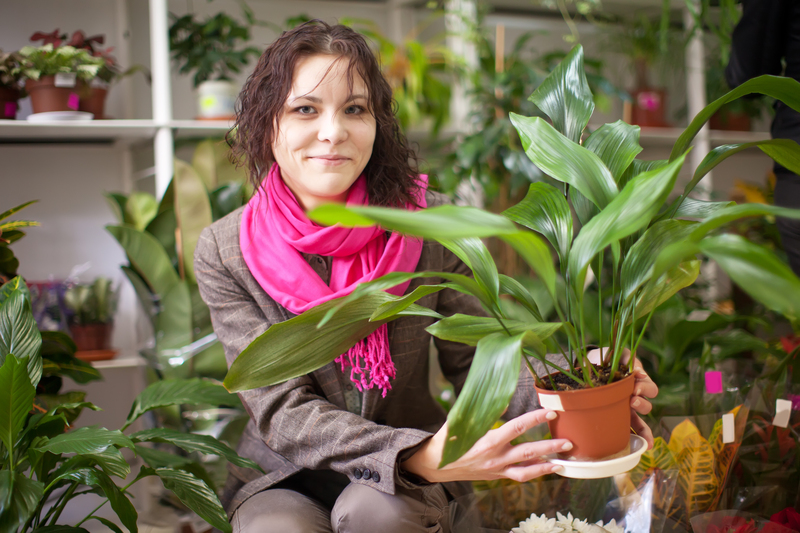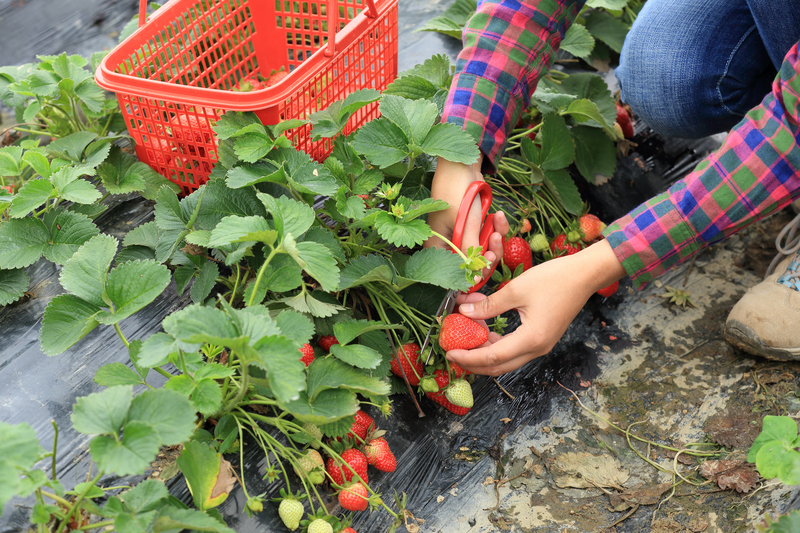Unlocking Potential: Organic Waste to Soil
Posted on 20/08/2025
Unlocking Potential: Organic Waste to Soil
In the quest for more sustainable living, one of the most powerful yet understated tools at our disposal is the transformation of organic waste into fertile soil. This process, known as organic waste to soil-conversion or composting, has the capacity to revolutionize agricultural practices, reduce landfill usage, and improve the quality of our food, air, and water. In this comprehensive guide, we'll explore how to unlock the potential of organic waste, create richer soils, and contribute to a healthier planet.

Understanding Organic Waste
Organic waste encompasses a broad range of materials of biological origin that are typically discarded as trash. Examples include:
- Fruit and vegetable peels
- Coffee grounds and tea bags
- Eggshells
- Yard trimmings and leaves
- Food scraps
- Paper towels and napkins
Much of this waste ends up in landfills, where it generates methane, a potent greenhouse gas. By diverting organic matter from landfills and turning it into soil, we can significantly reduce our environmental impact.
The Power of Composting: Converting Organic Waste to Soil
Composting is nature's way of recycling. When managed properly, this process converts organic materials into humus, a rich, dark soil amendment teeming with beneficial microbes and nutrients.
How Composting Works
Composting is a biological process. Microorganisms such as bacteria, fungi, and worms break down organic material, unlocking its nutrients and transforming it into a stable soil amendment. This process requires four essential elements:
- Carbon (from dried leaves, straw, and paper products)
- Nitrogen (from food scraps, grass clippings, and manure)
- Oxygen (to support aerobic microbes)
- Water (to maintain moisture levels)
When these elements are balanced correctly, organic waste breaks down efficiently and transforms into high-quality soil.
Types of Composting Methods
There are several ways to convert organic waste into soil, each with its unique advantages:
- Backyard composting: Ideal for households with gardens. Organic matter is collected in outdoor bins or piles and regularly turned to aerate and mix the contents.
- Vermicomposting: Involves the use of worms (usually red wigglers) to speed up the decomposition process. Suitable for indoor or small-space composting.
- Bokashi fermentation: An anaerobic method using specialized microbes to ferment organic material. It can handle meat and dairy products that traditional composting cannot.
- Commercial or industrial composting: Large-scale systems managed by municipalities or private companies to process organic waste from communities or industries.
The Benefits of Turning Organic Waste into Soil
Recycling organic waste into soil goes far beyond reducing garbage. Here are some compelling benefits:
- Reduces landfill waste: A significant portion of municipal solid waste is organic material. Diverting it lessens landfill strain and lowers greenhouse gas emissions.
- Improves soil health: Finished compost enriches soil structure, adds essential nutrients, and fosters beneficial microbial activity.
- Promotes water retention: Compost-amended soils retain moisture more efficiently, reducing the need for frequent irrigation.
- Minimizes need for chemical fertilizers: Compost naturally supplies nitrogen, phosphorus, potassium and micronutrients, helping to replace synthetic fertilizers.
- Supports biodiversity: Healthy soil is the foundation for thriving plant and animal life, from earthworms to pollinators.
- Reduces climate change impact: By keeping organic material out of landfills and storing carbon in soil, composting plays a vital role in climate mitigation.
Step-by-Step Guide: How to Transform Organic Waste into Rich Soil
Transitioning from simply discarding kitchen scraps to making nutrient-rich soil is easier than you might think. Here's a practical guide:
1. Choose Your Composting Method
- If you have outdoor space, a backyard compost pile or bin works well.
- For apartments or limited space, consider vermicomposting or bokashi systems.
- Research municipal composting options in your area; many cities now offer curbside pickup for food waste.
2. Collect the Right Materials
- "Greens" (nitrogen-rich): Fruit and vegetable scraps, coffee grounds, eggshells, tea leaves, grass clippings.
- "Browns" (carbon-rich): Dead leaves, straw, shredded paper, cardboard, wood chips.
Tip: Maintain a ratio of about 2-3 parts brown to 1 part green for optimal decomposition.
3. Layer and Moisten
- Start your pile with coarse "browns" for aeration.
- Alternate layers of greens and browns.
- Moisten each layer as you build the pile, but avoid over-saturation.
4. Turn and Monitor
- Aerate your compost regularly by turning it with a pitchfork or compost aerator to speed up decomposition and prevent odor.
- The pile should feel like a squeezed-out sponge -- moist but not dripping.
5. Harvest Your Compost
- Compost is ready when it looks dark, crumbly, and earthy with no recognizable food scraps.
- This process can take anywhere from 3 months to 2 years, depending on the method and materials.
- Sift the finished compost and use it to enrich your garden soil, potted plants, or lawn.
Common Concerns and Troubleshooting
Dealing with Pests and Odors
Properly maintained compost does not attract pests or create foul smells. If you encounter issues:
- Odor: Add more browns, turn the pile for aeration, and avoid adding meat or dairy products.
- Flies and Pests: Cover fresh food scraps with a layer of browns and use a closed bin if needed.
What Not to Compost
- Meat and fish scraps (unless using bokashi)
- Dairy products
- Pet waste
- Diseased plants
- Greasy or oily foods
- Coal ashes
How Organic Waste to Soil Enriches Agriculture and Gardens
Turning food scraps and yard trimmings into compost delivers tangible benefits to farms and home gardens alike:
- Increases soil nutrient content: Compost releases slow, steady nutrients, supporting robust plant growth.
- Enhances soil structure: Compost improves porosity and drainage, reducing erosion.
- Encourages beneficial microbe diversity: Good soil teems with life, supporting healthy plants and fighting disease naturally.
Studies have shown that compost-amended soils can produce higher yields and more resilient crops -- a game-changer for food security in the face of climate change.
Urban Solutions: Community Composting and Municipal Programs
Not everyone has access to a backyard or garden, but urban composting is rapidly gaining momentum. Many cities offer:
- Compost drop-off sites at farmers markets or community gardens
- Green waste bins for curbside pickup
- Incentives for local businesses and restaurants to recycle organic material
- Educational workshops for residents and schools
By participating in community composting programs, urban dwellers can contribute to the production of local soil amendments, fueling urban agriculture and green spaces.
The Science Behind Organic Waste to Soil Transformation
Unlocking the potential of organic waste to create soil is backed by robust science. Microbial action:
- Breaks down complex carbohydrates and proteins into simpler compounds
- Builds humus, which sequesters carbon and stores nutrients
- Suppresses plant pathogens through microbial competition
Compost's high organic matter content makes it invaluable for restoring degraded soils and supporting sustainable land management practices.
Myths and Facts About Composting and Soil Creation
-
Myth: Composting is smelly and messy.
Fact: With proper maintenance, composting is clean, efficient, and odor-free. -
Myth: Only gardeners benefit from compost.
Fact: Everyone can participate, reducing waste and supporting the larger ecosystem. -
Myth: Composting is too complex for beginners.
Fact: Starting a compost pile is as simple as separating your food scraps and adding them to a bin.
Innovative Approaches to Organic Waste Management
Modern technology is making organic waste recycling more accessible. Smart compost bins, community-scale digesters, and AI-powered waste-sorting systems are helping cities and companies process larger volumes of organic material efficiently.
These innovations ensure that even in dense urban environments, the conversion of organic waste into soil is part of a circular economy that benefits everyone.
Unlocking the Future: The Role of Organic Waste to Soil in Sustainable Living
As we move toward more sustainable lifestyles, turning organic waste into fertile soil is essential for addressing climate change, conserving resources, and improving food quality. By participating--whether at home, at work, or in our communities--we can unlock the full potential of our food scraps and yard waste.
- Composting is accessible--there's a method to suit every lifestyle.
- The benefits extend from your backyard to the global environment.
- By returning nutrients to the earth, we close the loop and create a cycle of abundance.
Start your journey today and be a catalyst for change--transforming organic waste into life-giving soil for generations to come.

Frequently Asked Questions (FAQs)
Why should I turn organic waste into soil?
Diverting organic waste from landfills reduces methane emissions, enriches soil, conserves water, and supports plant and environmental health.
How long does it take to make compost?
Depending on your method, composting can take a few months to up to two years. Hot composting and regular aeration speed up the process.
Can I compost indoors?
Absolutely! Worm bins (vermicomposting) and bokashi systems are excellent for apartments and indoor spaces.
Is compost safe for all plants?
Finished compost is safe and beneficial for most plants, gardens, and lawns. Avoid using unfinished compost, which may still contain decomposing materials.
Conclusion: From Waste to Wealth--Unlock the Power of Organic Waste to Soil
Organic waste to soil transformation is a simple yet powerful act with far-reaching effects. By embracing composting in our homes, communities, and agricultural systems, we turn potential waste into invaluable natural resources. The cycle of growth and renewal starts with us--and our willingness to see value in what we throw away.
Take the first step today. Organize your kitchen scraps, start a compost pile, or join a local program. Witness firsthand how organic waste, when nurtured, blossoms into vibrant, life-sustaining soil--unlocking the true potential hidden in your daily discards.

